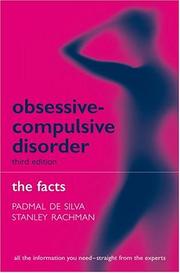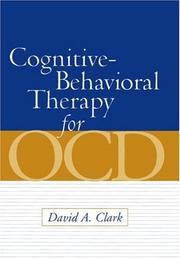| Listing 1 - 4 of 4 |
Sort by
|

ISBN: 0198520824 Year: 2004 Publisher: Oxford Oxford university press
Abstract | Keywords | Export | Availability | Bookmark
 Loading...
Loading...Choose an application
- Reference Manager
- EndNote
- RefWorks (Direct export to RefWorks)

ISBN: 1572309636 9781572309630 Year: 2004 Publisher: New York (N.Y.): Guilford press,
Abstract | Keywords | Export | Availability | Bookmark
 Loading...
Loading...Choose an application
- Reference Manager
- EndNote
- RefWorks (Direct export to RefWorks)
Book
ISBN: 2100071386 9782100071388 Year: 2004 Publisher: [Paris] : Dunod,
Abstract | Keywords | Export | Availability | Bookmark
 Loading...
Loading...Choose an application
- Reference Manager
- EndNote
- RefWorks (Direct export to RefWorks)
Obsessive-compulsive disorder. --- Child psychopathology. --- Adolescent psychopathology. --- Névroses obsessionnelles --- Enfants --- Adolescents --- Psychopathologie --- Obsessive-Compulsive Disorder --- Child --- Adolescent --- Anxiety Disorders --- Névroses obsessionnelles
Article
Abstract | Keywords | Export | Availability | Bookmark
 Loading...
Loading...Choose an application
- Reference Manager
- EndNote
- RefWorks (Direct export to RefWorks)
Rats undergoing extinction of lever-pressing for food after session not preceded by signal attenuation, paroxetine, the attenuation of an external feedback for this behavior, fluvoxamine and desipramine affected only the number of exhibit excessive lever-pressing unaccompanied by an attempt to collect a reward, which may be analogous to the excessive and unreasonable behavior seen in obsessive-compulsive disorder (OCD). Given that one of the most salient features of OCD is its selective response to treatment with serotonin re-uptake inhibitors (SRIs), the present study compared the effects of the SRIs paroxetine and fluvoxamine on compulsive lever-pressing, with those of the tricyclic antidepressant, desipramine, and the benzodiazepine, diazepam, which are not effective in the treatment of OCD. Paroxetine (11-15 mg/kg) and fluvoxamine (10-20 mg/kg) dose-dependently reduced the number of compulsive lever-presses and the number of lever-presses followed by an attempt to collect a reward; desipramine (5-15 mg/kg) dose-dependently reduced only the number of lever-presses followed by an attempt to collect a reward; diazepam (2-10 mg/kg) did not affect either type of lever-pressing, except for the highest dose (110 mg/kg), which almost completely abolished lever-press responding. When administered in an extinction lever-presses followed by an attempt to collect a reward, whereas diazepam (4-8 mg/kg) decreased both types of lever-presses. The present findings strengthen the suggestion that compulsive lever-pressing may serve to model compulsive behavior in OCD, and lends the model predictive validity
Animal model. --- Animal-model. --- Antidepressant. --- Anxiety. --- Anxiolytic. --- Behavior. --- Benzodiazepine. --- Benzodiazepines. --- Compulsive. --- Diazepam. --- Disorder. --- Drug-treatment. --- Extinction. --- Feedback. --- Food. --- Lever-press. --- Model. --- Obsessive-compulsive disorder. --- Obsessive-compulsive. --- Ocd (obsessive-compulsive disorder). --- Ocd. --- Pharmacotherapy. --- Post-training signal attenuation. --- Rat. --- Rats. --- Response. --- Reward. --- Schizophrenia. --- Serotonin. --- Time. --- Training signal attenuation. --- Treatment.
| Listing 1 - 4 of 4 |
Sort by
|

 Search
Search Feedback
Feedback About
About Help
Help News
News